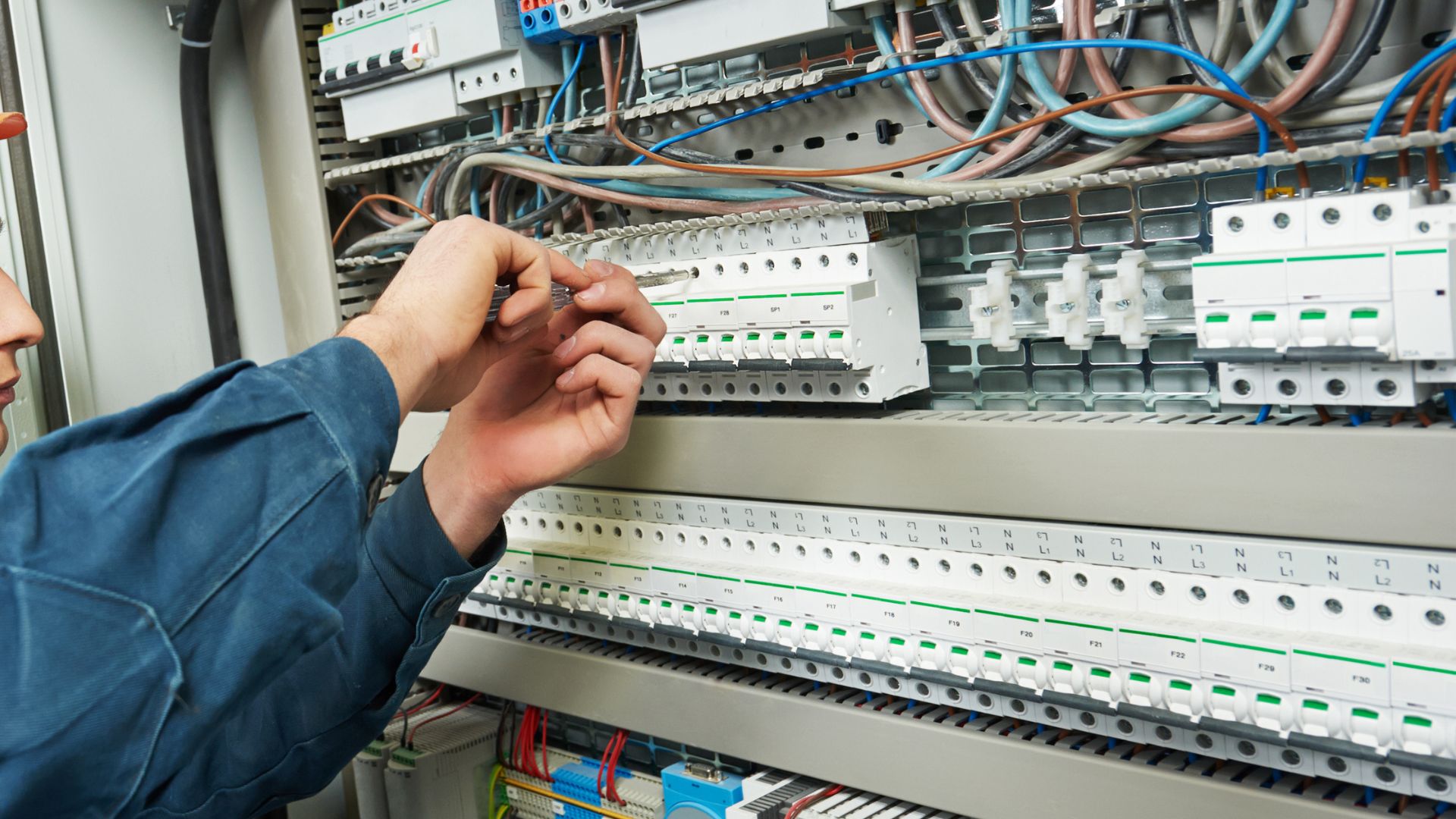Embarking on a career as an electrician in Texas is dynamic and fulfilling, with clearly defined levels within the field. Whether starting as an apprentice or aiming for the pinnacle as a master electrician, each stage requires distinct skills and responsibilities. Whether aspiring to advance skills or curious about the electrician profession in Texas, this guide is a valuable resource.
Key Takeaways
Electrician jobs in Texas are categorized into three primary levels: Apprentice, Journeyman, and Master Electrician, each with specific training and responsibilities.
Electricians can specialize in residential, commercial, industrial, or maintenance roles, enabling tailored career paths and expertise in specific areas.
Continuous education is crucial for Texas electricians to maintain licenses, stay updated with industry advancements, and pursue higher-paying opportunities.
Apprentice Electrician
Starting as an apprentice electrician in Texas marks the entry into the electrical trade. The minimum educational requirement is a high school diploma. Apprenticeships typically span four to five years, combining coursework with substantial hands-on training. This ensures apprentices gain essential theoretical knowledge and practical experience.
On-the-job training includes safety practices and occurs in various conditions, often physically demanding and noisy.
Apprentices engage in classroom instruction covering wiring practices, electrical theory, and the National Electrical Code before joining a commercial electrician team. Mentorship by seasoned professionals during fieldwork helps implement learned skills and prepares for journeyman status. Apprentices also learn about repairing electrical equipment as part of their hands-on training.
An apprentice electrician’s role encompasses installing wiring frameworks, troubleshooting devices, and maintaining setups, which are crucial for technical proficiency and career advancement in Texas.
Journeyman Electrician
Achieving journeyman electrician status in Texas is a significant milestone. Completing an apprenticeship and passing a licensing exam earn certification as a journeyman electrician. This status allows independent handling of diverse electrical systems, including the ability to repair electrical systems, take on intricate tasks, and mentor apprentices.
In environments from homes to business infrastructures, journeyman electricians are pivotal in setting up, maintaining, and repairing electrical components. Their ability to work unsupervised and their comprehensive understanding of electrical concepts make them indispensable to construction and maintenance crews in Texas.
Read more: Renew a Journeyman Electricians License in Texas
Master Electrician
Becoming a master electrician in Texas signifies commitment, expertise, and experience. This level allows for managing intricate electrical projects and directing journeyman electricians. Candidates need significant hands-on experience as journeymen and must pass a challenging licensing exam covering electrical systems and regulations.
Master electricians in Texas assume leadership roles, ensuring safety protocols and building code compliance. They are often responsible for upgrading electrical systems to ensure they meet current standards and regulations. Managing complex challenges secures their reputation as valued authorities, consistently in demand across the industry.
Specializations within Electrician Levels in Texas
Electricians in Texas can specialize, focusing on areas of interest. Options include residential, commercial, industrial, or maintenance electrical work. Each specialization involves different duties and environments, enabling tailored career paths based on abilities and preferences.
An industrial electrician might work in large-scale facilities like power plants, handling complex systems.
Specializing not only promotes personal growth but ensures expert attention to electrical systems across industries, supporting the efficient operation of Texas’s infrastructure.
Residential Electricians
Residential electricians manage household electrical systems, maintaining electrical systems to ensure the safe operation of components like lighting and security systems. They diagnose system issues, enhance setups, and perform repairs. Increasingly, they engage with renewable energy solutions like solar panel installations.
Qualifying as a residential electrician in Texas involves extensive training and passing examinations, ensuring readiness to tackle residential electrical work demands.
Commercial Electricians
Commercial electricians focus on workplace electrical systems, including power systems, installing, maintaining, and repairing wiring and components. They ensure safe, efficient building operation, installing systems like security and HVAC. During new project phases, they may contribute to designing and strategizing system layouts.
Safety and regulation compliance is critical in commercial settings, making specialized apprenticeships essential for success in Texas.
Industrial Electricians
Industrial electricians are vital in facilities like power plants and factories, as well as in installing, troubleshooting, and repairing electrical equipment. They manage high-voltage systems and substantial machinery, requiring specialized skills.
Training under seasoned professionals provides the hands-on experience needed to navigate industrial tasks effectively in Texas.
Maintenance Electricians
Maintenance electricians focus on equipment upkeep and repair across various settings. They inspect systems, troubleshoot issues, upgrade components, and handle upgrading electrical systems, ensuring functionality and longevity.
Becoming a maintenance electrician in Texas requires rigorous apprenticeship programs and licensing, ensuring proficiency in maintaining complex systems.
Specialized Electrician Roles
Electricians can specialize in various roles, each requiring unique skills and certifications. Two such specialized roles are Linemen or Outside Electricians and Installation Technicians.
Linemen or Outside Electricians
Linemen, also known as Outside Electricians, play a crucial role in the electrical industry by working outdoors to install and maintain high-voltage electrical power lines, towers, and substations. These professionals ensure the safe and efficient transmission of electricity from power plants to consumers, making them essential to the power infrastructure.
Working as a Lineman involves facing challenging weather conditions, such as extreme temperatures, rain, or snow. Additionally, Linemen must be comfortable working at significant heights, often climbing poles and towers to perform their duties. The physical demands and potential hazards of this role require a high level of fitness and adherence to strict safety protocols.
Installation Technicians
Installation Technicians specialize in installing low-voltage electrical systems, including voice, data, and video cabling. These systems are integral to modern communication and information networks, making the role of Installation Technicians vital in both residential and commercial settings.
Working alongside Inside Wiremen, Installation Technicians often find themselves in cramped or hard-to-reach spaces, requiring excellent problem-solving skills and the ability to troubleshoot issues with electrical systems. Precision and attention to detail are crucial in this role, as even minor errors can lead to significant problems in the systems they install and maintain.
Training and Licensing in Texas
Becoming a licensed electrician in Texas involves several stages, progressing through apprentice, journeyman, and master levels, each with specific criteria and duties. Electrician licenses are issued at each stage, with requirements varying by state and industry.
Training programs combine classroom education with real-world practice, equipping apprentices with the necessary skills. Journeyman certification requires apprenticeship completion and passing a licensing exam, ensuring readiness for independent work. Master electrician status demands extensive journeyman experience and passing a comprehensive exam, signaling peak proficiency.
Safety and Working Conditions
Electricians often work in hazardous environments, and their safety is of utmost importance. Employers must provide on-the-job training on safety protocols, and electricians must adhere to strict safety guidelines to minimize the risk of injury.
Safety Protocols
Electricians must follow safety protocols to prevent electrical shock, falls, and other injuries. Some essential safety protocols include:
- Wearing Personal Protective Equipment (PPE): This includes hard hats, safety glasses, gloves, and other gear designed to protect against electrical hazards and physical injuries.
- Lockout/Tagout Procedures: Ensuring proper lockout/tagout procedures are followed when working on electrical systems to prevent accidental energization.
- Using Insulated Tools and Equipment: Utilizing tools and equipment designed to prevent electrical shock, which is crucial when working with live electrical components.
- Maintaining Safe Working Distances: Keeping a safe distance from power lines and electrical equipment to avoid accidental contact and potential injuries.
- Ladder Safety: Following proper ladder safety procedures when working at heights to prevent falls and related injuries.
By adhering to these safety protocols, electricians can minimize the risk of injury and ensure a safe working environment, allowing them to perform their duties effectively and efficiently.
Wrapping Up
Continuing education is vital for Texas electricians, keeping them updated on industry developments and safety standards. It enhances skills, opens new opportunities, and ensures license maintenance.
At State Approved Continuing Education, we offer flexible online courses endorsed by the Texas Department of Licensing and Regulation (TDLR), enabling ongoing learning and certification renewal. So, why wait? Contact us today to enroll in one of our approved courses on electrician continuing education in Texas and stay ahead in the ever-evolving electrical industry.




